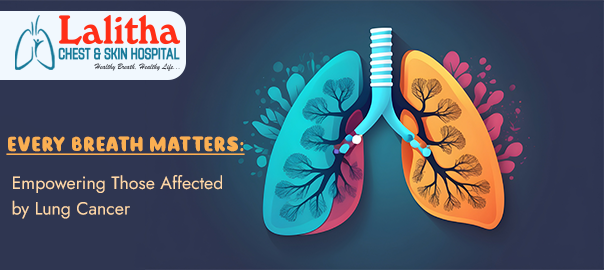Lung cancer is a condition characterized by uncontrolled growth of abnormal cells in the lungs. It commonly arises due to smoking but can also affect non-smokers. Symptoms include persistent cough, chest pain, and difficulty breathing. Early detection is vital for effective treatment, as lung cancer can spread rapidly if left unchecked,” says the best pulmonologist in Karimnagar, Dr. Raj Kumar Korra.
So, with insights from Dr. Raj Kumar Korra, a lung specialist in Karimnagar, we aim to provide you with the most relevant information about lung cancer, including its causes, preventive measures, types, symptoms, and treatment options. Our goal is to offer comprehensive awareness about this condition. Read on to know more:
What causes lung cancer?
Certainly! In addition to smoking and environmental factors, several other factors contribute to the development of lung cancer.
Second-hand smoke: Non-smokers exposed to tobacco smoke have an increased risk of developing lung cancer.
Air pollution: Prolonged exposure to polluted air, particularly in urban areas with high levels of pollution, is associated with an increased risk of lung cancer.
Family history and genetic factors: Individuals with a family history of lung cancer or certain genetic mutations may have a higher predisposition to the disease.
Chronic inflammation: Chronic inflammation in the lungs due to conditions like tuberculosis or chronic bronchitis may increase the risk of lung cancer.
What are the precautions we need to take for lung cancer?
Regular medical check-ups: Schedule regular check-ups with your healthcare provider to monitor your overall health and discuss any concerns or symptoms that may indicate lung cancer or other health issues.
Occupational safety measures: If you work in industries with known carcinogenic exposures, such as mining or construction, follow recommended safety protocols, use protective equipment, and participate in workplace health and safety programs.
Avoid exposure to indoor pollutants: Take steps to minimize exposure to indoor pollutants such as cooking fumes, cleaning chemicals, and volatile organic compounds (VOCs) from household products. Use ventilation systems and natural ventilation when possible.
What are the symptoms of lung cancer?
The symptoms of lung cancer can vary depending on the stage of the disease and other factors. Common symptoms may include:
- Persistent cough:A cough that doesn’t go away or worsens over time, often accompanied by coughing up blood (haemoptysis).
- Chest pain:Dull, aching, or sharp pain in the chest, shoulders, or back that may worsen with coughing or deep breathing.
- Shortness of breath:Feeling breathless or experiencing difficulty breathing, even with mild exertion.
- Wheezing:A whistling or squeaking sound when breathing, which may indicate airway obstruction.
- Hoarseness:Changes in the voice, such as persistent hoarseness or raspy voice, which may result from vocal cord involvement or compression of the recurrent laryngeal nerve.
- Fatigue:Persistent tiredness or weakness that doesn’t improve with rest, often due to the body’s immune response to cancer or anaemia caused by bleeding.
- Unexplained weight loss:Significant and unintentional weight loss, often associated with loss of appetite and wasting syndrome.
- Loss of appetite: A decrease in appetite or aversion to food, leading to unintentional weight loss.
- Bone pain:Pain in the bones, especially in the back, hips, or chest, which may indicate cancer spread (metastasis) to the bones.
Types of lung cancer?
Lung cancer is broadly categorized into two main types: non-small cell lung cancer (NSCLC) and small cell lung cancer (SCLC), based on cellular appearance and behavior.
NSCLC includes:
Adenocarcinoma: Most common (40%), originates in airway cells, and can occur in smokers and non-smokers.
Squamous cell carcinoma: Accounts for 25-30%, linked to smoking.
Large cell carcinoma: Less common (10-15%), aggressive and often diagnosed late.
Adenosquamous carcinoma: Rare, shares features of adenocarcinoma and squamous cell carcinoma.
SCLC, less common, grows rapidly, and spreads early, primarily in heavy smokers. It’s divided into limited and extensive stages based on cancer spread.
Treatment for lung cancer?
Treatment for lung cancer depends on factors such as the type and stage of the cancer, the patient’s overall health, and their preferences. Common treatments include:
- Surgery:Surgical removal of the tumour and surrounding tissue is often recommended for early-stage lung cancer. Types of lung cancer surgery include wedge resection, segmental resection, lobectomy, and pneumonectomy.
- Radiation therapy:High-energy beams are used to target and destroy cancer cells. It may be used as the primary treatment for early-stage lung cancer, as adjuvant therapy following surgery, or to relieve symptoms and shrink tumours in advanced cases.
- Chemotherapy: Drugs are used to kill cancer cells or stop their growth. It may be used alone or in combination with other treatments, such as surgery or radiation therapy, for both early-stage and advanced lung cancer.
“Click here for additional information about lung cancer and its treatment options. For a comprehensive understanding of lung cancer and potential treatment approaches, we recommend scheduling an appointment with a specialized pulmonologist.”
Are you searching for a “breathing specialist doctor” or a “lung infection specialist” on Google? Your search ends right here. Lalitha Chest and Skin Hospital, renowned as the leading chest hospital in Karimnagar, is home to Dr. Raj Kumar Korra, a distinguished pulmonologist offering advanced treatments for all types of lung cancer. For inquiries, please visit us at https://lalithachestandskinhospital.com/


